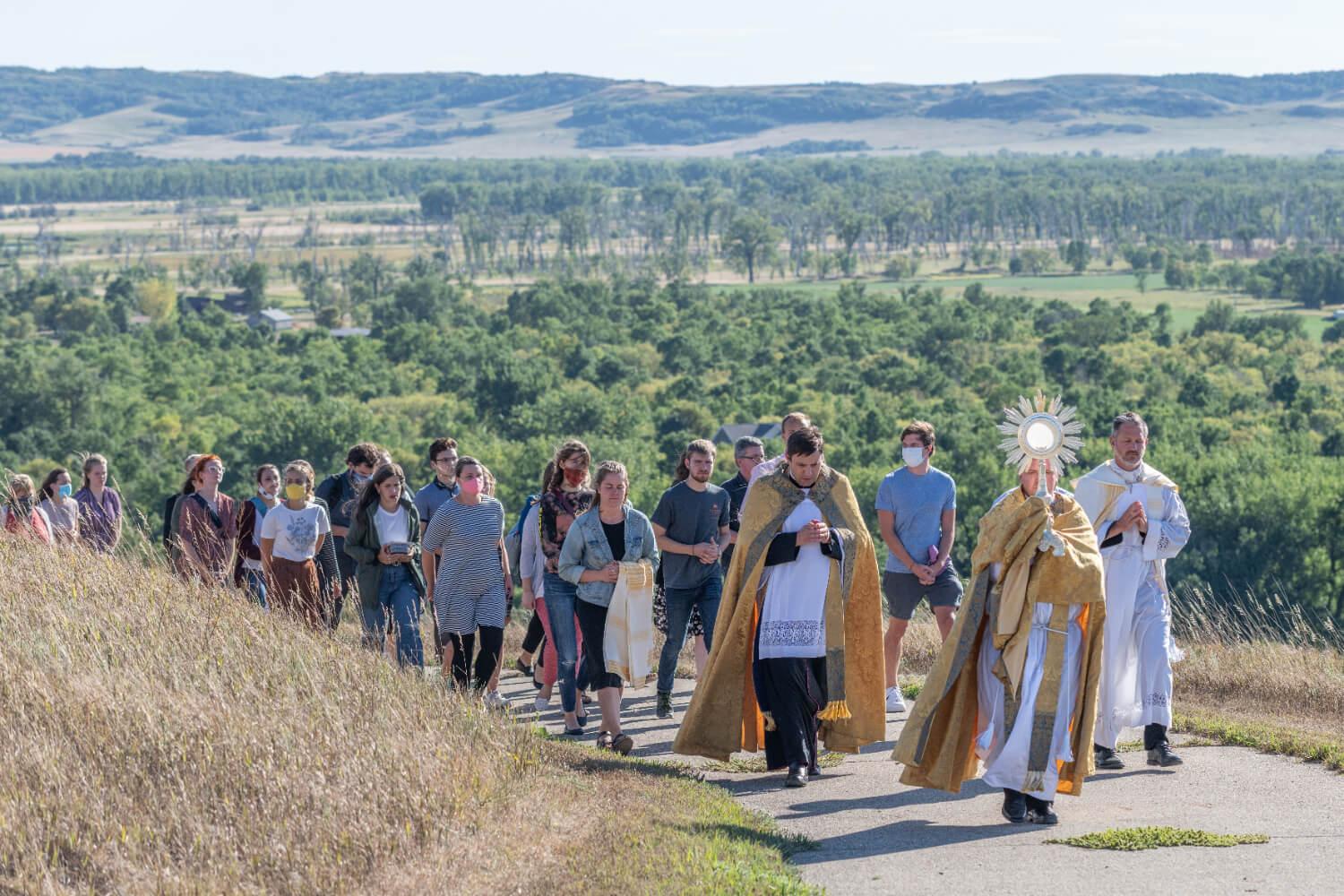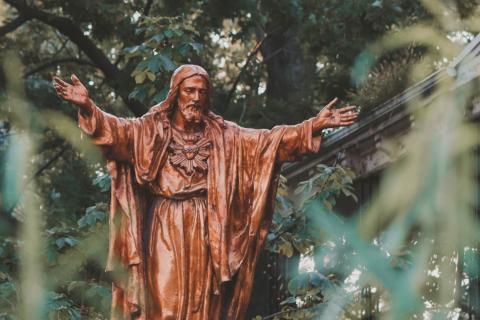
What is Catholic Studies? What is the point of it, what are its goals, and why is it needed?
This brief outline attempts to begin some answers to those questions. The intention is not to accomplish a thorough explanation of Catholic Studies or a complete working out of its implications. Every point here surely deserves further thought and elucidation, a process carried on by the Catholic Studies faculty and fellows as they work together on this joyful and pioneering task. This text rather has the practical purpose of providing the basic contours of the Catholic Studies project intellectually and institutionally, of clarifying certain questions that inevitably and persistently arise when discussing it, and of signaling the carefully discerned reasons and aspirations that led to the founding of the Catholic Studies program at the University of Mary.
It may be most helpful to begin by pointing out what Catholic Studies is sometimes thought to be, but is not. This approach is chosen in charity, the result of sustained experience. There are so often immediate misconceptions about Catholic Studies that serve to perplex or frustrate those wanting to understand or contribute to this work. It seems best to address some of these at the outset.
What Catholic Studies Is Not
1. Catholic Studies does seek the renewal and re-invigoration of Catholic universities, but it is not a remedial program.
There is a need for serious and creative renewal in Catholic universities, as the temptation has been powerful in recent decades to forget the fundamentals of Catholic faith and accommodate, more or less, to the reigning secular educational environment. While Catholic Studies is meant to be an agent for the Catholic renewal of universities, it is not remedial project for “lapsed” institutions; its purpose and intention go in a different direction.
By remediation is meant the process by which one part of something makes up for the lacks or incompetence of another part. We have remedial reading or remedial math programs for students who somehow did not learn their math or their reading adequately in previous classes they have taken. We are happy for such programs as meeting a serious need; but remediation is still at best a stop-gap measure. A more searching reform would look to the quality of the original classes, and would try to find ways to teach math and reading such that students would not need to take remedial courses later. So with our Catholic colleges and universities. Because many of our institutions have lost their way, and their various departments, especially theology, but also philosophy, the humanities, and even technical disciplines, no longer teach a Catholic orientation to the intellectual life, we might want to find stop-gap remedial ways to offer our students the education that those departments should be providing but are not.
If Catholic Studies were merely a remedial attempt to fill the gaps left by disciplines not doing their proper work, two consequences would follow. First, while we might approve of such a project if it were all we could muster in a given instance, those who were concerned for deeper reform would want to bypass remediation and get to the heart of things. Second, there would be no place for Catholic Studies in a Catholic university that was doing a good job at embracing its Catholic identity and the Catholic intellectual tradition. Simply put, the better a college or university was doing from a Catholic perspective, the less it would need a Center of Catholic Studies or a Catholic Studies program, and the more such a venture would needlessly complicate the university’s educational mission.
The noble idea behind the university from its beginnings has been the contention that reality is a unified and intelligible whole, a cosmos and not a chaos.
The purpose of Catholic Studies will be laid out more clearly below. Here it is enough to note this crucial point: it is not a remedial program whose worth depends upon the corruption or decay of the Catholic quality of an institution; it is not a kind of stealth Catholic theology or philosophy department established to make up for the sad state of existing ones, and in fundamental competition with them. To the contrary, Catholic Studies will do best when individual departments are strong and faithful to the Catholic tradition.
2. Catholic Studies is an ordered approach to reality, but it is not a typical academic discipline.
The noble idea behind the university from its beginnings has been the contention that reality is a unified and intelligible whole, a cosmos and not a chaos. Academic disciplines by their nature abstract one aspect of that whole and develop a method of study suited to it. The point of pursuing the various disciplines in the same geographic and social location has been to allow opportunities for the holistic vision to maintain itself against the inevitable tendency of disciplines to become isolated and to thereby distort the overall understanding of reality. To take an analogy from medicine: doctors specialize in various physical systems: skeletal, vascular, nervous, endocrine, etc. This is good and necessary, but no one specialty can address the totality of the person who is being treated. A human is not a circulatory system, or a bundle of nerves or muscles or digestive organs, but a whole being, and physicians need to find ways to remind themselves that their specialty does not exhaust the necessary care of the patient. If they fail to keep the whole person in view, even their specialized knowledge will prove harmful. The same is true with reality as a whole, and with the study of reality that takes place at a university. The current secular academic environment, lacking any consensus about the nature or even the existence of a cosmos, has devolved into mutually exclusive departmental and sub-departmental worlds. Catholic universities have largely followed their lead. This not only presents a problem for faith; it corrupts the specifically intellectual task of the university. It puts at risk the highest of the university’s aims, that of the relating of all that is studied to an overall understanding of things.
Catholic Studies is essentially interdisciplinary, which necessarily means that it does not possess a disciplinary methodology intrinsic to itself. It brings together scholars trained in different fields. Yet it is not simply a smorgasbord of approaches set side by side. Its method involves keeping the whole of reality in view from many different viewpoints. Its broad subject matter might be best described as the working out of the truth of the Incarnation in all its many aspects. Another way of putting it is that it involves the study of Christian culture in its many facets, and pursues that study from within the ecclesial communion. Its unity is found not in an explicit disciplinary method, but in a common set of first principles and ecclesial commitments, and in a common interest in seeing how all the truths of the faith and all the conclusions of reason have converged into a complex and variegated whole as the Church moves through time.
3. Catholic Studies is not a cultural studies program.
Catholic Studies does propose as its subject matter Christian culture, but it is not a typical cultural studies program. Despite its name – which invites a comparison with Women’s Studies, Minority Studies, or other such projects – Catholic Studies is not a program that simply applies various sociological, anthropological or geographical methodologies to that portion of the world called Catholic. While it studies the Catholic faith in its many expressions, it does not attempt to view Catholicism as an objectified field of investigation. It is rather an initiation into and embodiment of the Catholic way of understanding and being.
What is it then?
4. Catholic Studies is a community of scholars who are attempting together – in an interdisciplinary way – to incarnate the Catholic intellectual, moral, spiritual, and cultural tradition in the whole of their lives, and to initiate their students into that tradition.
Historian Christopher Dawson has noted that a Christian education is not so much the dissemination of information as an initiation into a mystery. This could probably be truly said about any genuine education. There is an unfortunate modern educational ideal that artificially locates the scholar in a position of abstracted and superior distance from that which is studied, and from which position he or she can subject whatever is studied to critique. The goal is usually called objectivity. Objectivity is praiseworthy when it pursues the important end of eliminating in any inquiry those aspects of subjectivity that would distort a true understanding. It is most straightforward in questions of natural science, though even in scientific study, a lack of an overall understanding of the cosmos and the proper place of the human in that cosmos can distort scientific inquiry. But this critical objective mode of inquiry becomes problematic when dealing with anything human; and in pursuing the knowledge of God, it is entirely barren. The modern university has come to be founded on certain dogmas about the world, one of which is that the only kind of genuine knowledge is that which can be scientifically verified or rationally proven. It thus teaches a stance of critical distance even in matters where such a stance will not arrive at genuine knowledge.
Catholic Studies faculty are not necessarily polymaths devoured by interest in dozens of fields. Rather, they are interested in how everything holds together... Not every thing, but everything, the whole, is the special passion of the Catholic Studies faculty.
In many matters, the true way to learn is not to sit in judgment from an abstracted distance; it is rather to entrust oneself to a tradition and to be initiated into its ways. How does a young gymnast become a Simone Biles or a young swimmer a Katie Ledecky? By entrusting herself to a coach and a system of training that she learns to master. She may one day contribute to the understanding and practice of the sport by her gifts and creativity, but she will do it from within the tradition; she begins by submitting to its demands in trust. If she begins by criticizing from a distance, she will never learn much of anything. (It is the athlete, not the sports writer, who is the champion.) The same is true, a fortiori, for the life of the mind.
Catholic Studies is a community of faculty and students who are together bringing a tradition into living form. It is first of all an academic program with a coherent object of knowledge, evidenced by the fact that degrees are offered in it. It is the ordered study of Christian culture, examining the relationships between faith and culture, faith and reason, faith and life. But far from being yet another curricular department, Catholic Studies is a unifying apostolic endeavor where the work and energy of the classroom kindles the life of the mind such that students are everywhere connecting what they know and are learning in all the humanities – indeed, the intellectual life – with their professional training and also what they do in the residence hall, at the pub, on the sports field.
The integrity of the program is not secured by the curriculum but by the faculty’s grasp of and living of the Catholic intellectual and spiritual tradition, and by their capacity to transmit it to the students entrusted to them. The faculty are attempting to incarnate that living tradition as best they can, individually and communally, and they are inviting students to embrace the same tradition. As such, the project cannot simply be reduced to a set of curricular commitments. A way of being is involved.
5. Catholic Studies aims at serving the wider university by maintaining the holistic Catholic vision of the cosmos in its many facets.
As noted above, the modern university suffers from a loss of a coherent intellectual vision, echoing a similar loss in the society at large. It is not surprising therefore that our universities have increasingly restricted themselves to technical career preparation rather than attempting to understand the world. Even in the non-technical disciplines, the current mode of intellectual formation in graduate schools is toward training in a highly specialized area of study, and in developing a corresponding “research agenda,” a program of formation that has meaning mainly in the development of the academic careers of professors. The institutional and economic factors behind this formation are powerful and hard to avoid.
Catholic Studies provides an institutional form for holding together the various strands of Catholic intellectual life such that the Catholic university can maintain its intellectual integrity. It is a community of scholars who share a common mission and a common vision, and who help carry that vision for the sake of the entire university. Its mission is both to incarnate this integral vision in its faculty and student community and to find ways to serve the broader faculty in their maintenance of the university’s integrity, thus helping to keep at bay the strong currents that tend to intellectual isolation and the dissolution of a coherent overall vision. Catholic Studies faculty contribute both individually and communally to the pursuit of the unity of knowledge and the ultimate complementarity of faith and reason through interdisciplinary scholarship, conferences, lectures, faculty development seminars, and colloquia. They do so not only in the realization of their own community of faculty and students but also in bringing together others from around the university in a sustained exploration of the complex history and present promise of Catholic thought and culture.
...the institutional direction and pressure of the modern university tends to leave the student at the margins of the university project, present mainly as a source of income and therefore dealt with in a consumerist fashion. Catholic Studies moves in the opposite direction.
It may be thought that the department of theology, as dealing with matters of revealed truth, or of philosophy, as treating the most fundamental questions, have historically been the means of maintaining this integrative role in the university; but this is a misunderstanding. It is the case that the truths of theology and philosophy, as held by the various faculty throughout the university’s departments, have been essential for the university’s common intellectual project. Theology and philosophy faculties have played an indispensable role in pursuing, ordering, and regulating the content of that shared vision. But the institutional instrument for maintaining the organic unity of those truths, of holding the cosmos together for faculty and students, has not been, nor can it be, an academic department pursuing an area of specialized theological or philosophical study. The living organism that has most typically carried the university’s holistic vision, from the time of its medieval founding to the recent past, has been a religious community or a group of religious communities, bodies that have integrated the whole Catholic intellectual and spiritual tradition in their rule and their common life. They have thus maintained in a living reality the various facets of the university’s mission, and done so according to a human scale that has allowed personal knowledge of one another and a shared life. The diminishment or loss of such vigorous and meaningful communal life and presence in many places explains much of the current intellectual crisis of Catholic universities.
6. Catholic Studies faculty are interested in students.
The poet John Ciardi once said: “A university is what a college becomes when the faculty loses interest in its students.” Of course, many professors do have a heart for their students. But the institutional direction and pressure of the modern university tends to leave the student at the margins of the university project, present mainly as a source of income and therefore dealt with in a consumerist fashion. Catholic Studies moves in the opposite direction. It is essentially apostolic. As an ecclesial mission, Catholic Studies will naturally express itself in worship and living arrangements and other forms of Catholic cultural life; students will be with their professors at daily Mass and catch sight of them in Adoration of the Blessed Sacrament, and the project will penetrate and assist the work of residential life and university ministry in striking ways. But these are the outworkings of its more fundamental intellectual mission. “Do not by conformed to this world, but be transformed by the renewal of your minds…” (Rom 12:1) According to the Scriptures and the long Catholic tradition, the mind, as our highest faculty, is the primary place of conversion. Catholic Studies faculty are supremely interested in their students and hope to serve them by providing them a context for this work of transforming the mind.
7. Catholic Studies faculty are interested in everything.
Catholic Studies faculty are not necessarily polymaths devoured by interest in dozens of fields. Rather, they are interested in how everything holds together. The Catholic Studies faculty member may be highly trained as a specialist, but that training will not have quenched a deeper thirst for relating that specialization to the whole of what is known. The trained theologian is interested in the way literature uniquely conveys truth. The specialized historian wants to understand the theological underpinnings of various ages. Natural science, economics, artistic expression: how are they to be properly integrated into the Christian account of reality? Not every thing, but everything, the whole, is the special passion of the Catholic Studies faculty.
8. Catholic Studies is a work of energy and hope.
Because the breathtaking truth of the Incarnation is at the foundation of Catholic Studies, it is an energetic and creative project, sounding a note of resilient hope throughout the University community. Fr. David Burrell, a Holy Cross priest at Notre Dame, was told by a dying friend: “We can live our lives either out of gratitude or resentment – there is no middle ground.” And so Catholic Studies faculty are vigilant to guard themselves, their colleagues, and their students against a spirit that would understand challenges or obstacles from the viewpoint of scarcity: not enough time, security, talent, resources. For the true question is not one of scarcity but of abundance. How does one navigate the astonishing range of what we have been given which we could never deserve? Time does seem too short, but too short to take in all the wonder and opportunity and possibility of life. How does the Christian mind, how does the disciple, grapple with this overabundance, the unlooked-for gift of life from Christ? The tone of this question animates the whole project.


